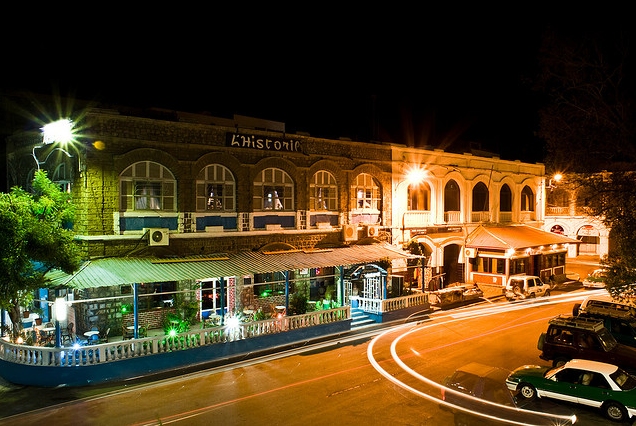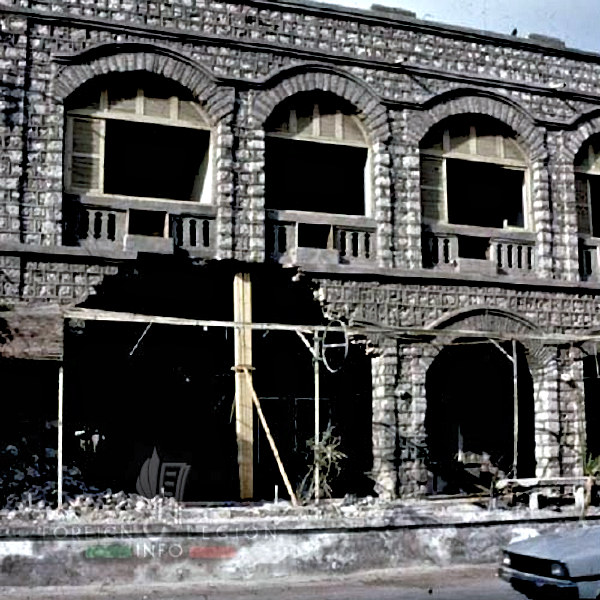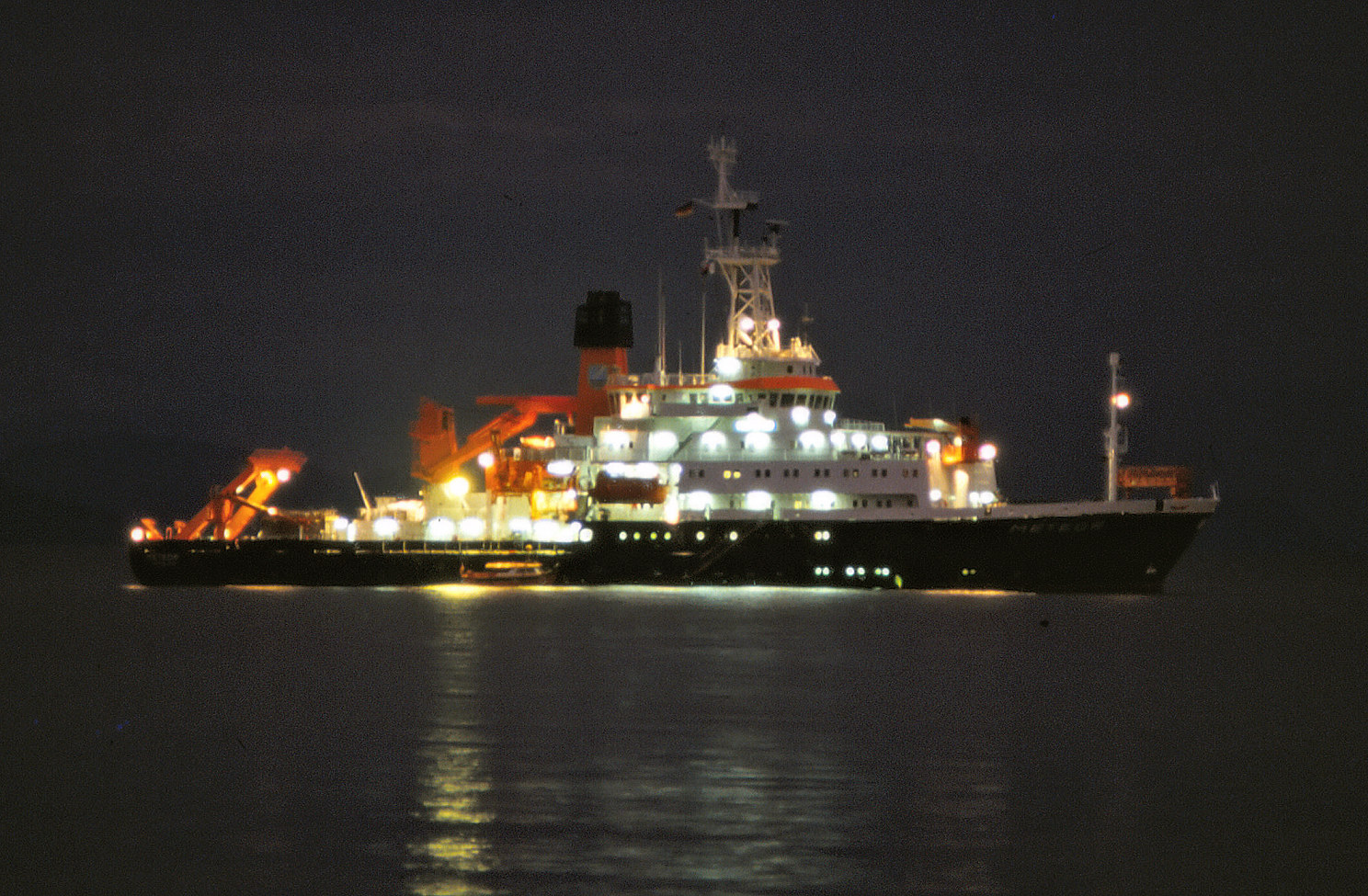
The restaurant l'Historil in Djibouti, as the group of students and scientists must have seen it during their visit the night before the attack.

In January 1987, the German research vessel Meteor 3 set off on an expedition lasting almost ten months. For four young researchers, it was a voyage to their deaths, and for four others it was a horror experience that continues to have an impact to this day. When the research vessel Meteor 3 left Hamburg on January 2, 1987, for the Mediterranean - its first leg of the journey - the researchers faced a long voyage that would take them via Port Said (Egypt), Djibouti (Djibouti), Goa (India), Karachi (Pakistan) and, on the way back, via Dar-es-Salam (Tanzania), Djibouti, Jiddah (Saudi Arabia), Heraklion (Crete) and Palermo (Italy). The program included explorations and measurements of "Fauna and Production in the Deep Water of the Eastern Mediterranean; Deep Water Circulation, Production Biology, and Benthic Communities in the Red Sea; Comparative Sedimentological and Planktological Processes in the Northwestern Indian Ocean; or Life in Low Oxygen Deep Water." A training course on bathymetric survey techniques was also scheduled. This was the fifth and first extended research cruise of the vessel, which was commissioned in 1986 as the successor to Meteor 2. The vessel is just over 97 meters long and has a speed of 12 knots. The detailed cruise report of the MINDIK expedition is available for download from here.
In addition to scientists staff, the research team also included doctoral candidates and students. The second leg of the expedition ran from Port Said through the Red Sea to the port of Djibouti. Coincidentally, the first IGADD (International Authority on Drought and Development) donor conference on drought and development in Djibouti was being held there from March 16 to 18, 1987. The World Bank had delegated representatives there. The security forces were sensitized. The Meteor was anchored in the harbor. On March 17, the scientists Uwe Piatkoswki, Klaus von Bröckel, Hans-Wilhem Halbeisen and the students Annegret Stuhr, Ilka Peeken, Marco Buchalla, Daniel Reinschmidt, Annette Barthelt travelled from Hamburg to Djibouti. On the morning of March 18, 1987, the group arrived in Djibouti and first settled in on the Meteor.
In the evening, the 8 German students and researchers met on the terrace of the restaurant l'Historil, a colonial-style café and restaurant frequented by soldiers and French Foreign Legionnaires in civilian clothes, to enjoy a few hours of local color before about 3 weeks of sea voyage were to follow. The anticipation of the young marine scientists was great, it was not easy to get one of the desirable places on a research vessel like the Meteor. But for the 8 Germans, as soon as they arrived, everything was over at 7:13 p.m. that evening. At that time, a bomb exploded in the restaurant with terrible consequences. It had been placed in an inconspicuous bag near the table of the young Germans by a Palestinian terrorist. The students Annette Barthelt, Marco Buchalla and Daniel Reinschmidt were immediately killed. Four of the young Kiel marine scientists survived seriously injured with burns, amputations, bone shattering, damaged eardrums and internal injuries. The insidious terrorist attack claimed a total of 13 lives and injured 41.

The victims of the attack were initially taken to the French military hospital in Djibouti for emergency treatment. Two days later, the German Air Force flew out the Germans killed and injured in the attack. The return transport and immediate care in Germany was perfectly organized by VLRI Dr. Karl Heinz Kunzmann of the Foreign Office Germany with great commitment. A short time later, however, the fisheries biologist Hans-Wilhelm Halbeisen died due to his severe injuries in the University Hospital in Bonn.
The terrorist - Adouani Hassan ben Hamouda - a Tunisian who had arrived at the scene of the crime by cab, complete with bomb, was captured on March 19, 1987, sentenced to death in 1991 and, after appealing, sentenced to life imprisonment. He belonged to the Palestinian People's Liberation Front (PPLF), a terrorist organization that emerged from the PLO and had existed since around the end of the 1970s.
The map shows the location of the l´Historil restaurant in Djibouti. After the attack, the restaurant was rebuilt. Already in December 1977, an attack was carried out there in which several people were killed. In 1990, an attack was carried out in Djibouti on the Café de Paris, a simultaneous renewed attack on the l'Historil failed, the grenades thrown into the restaurant did not explode. In 2014, there was another suicide bombing in Djibouti, again at a restaurant popular with Western foreigners, La Chaumière. Several Germans were also injured. Despite this precarious situation, the restaurant and café l'Historil is now a popular terrace cafe and restaurant, according to travel media on social networks. However, the official British government services currently estimate the probability that terrorists may try to carry out attacks in Djibouti as very high. The attacks could be at random and could take place at any time, but especially in places frequented by foreigners, such as hotels, restaurants, and shopping malls. Some 35 years after the attack, visiting Djibouti is still a high risk.
In the days following the bomb attack in Djibouti, the Meteor directors Board, the DFG, and the scientists involved discussed a termination of the entire MINDIK expedition. The shock of the attack was deep-seated and the feeling towards the victims and the injured was that the expedition could not simply continue as if nothing had happened. In the end, however, the decision was made to continue the expedition, as they did not want to give in to the terror. In addition, numerous exams and doctoral projects were tied to the collection of data from the following legs of the expedition; one did not want to deprive the young scientists of the opportunity to collect the necessary data. Marine researcher and journalist Hanns-Joachim Neubert was commissioned to document the new Meteor's first major voyage abroad for German television. He and his team wanted to accompany the expedition from Djibouti to Muscat in Oman. The journalist became an eyewitness to the devastating consequences of the bombing and wrote a very personal report about it (1987: When Djibouti was not yet a fortress). The documentary about the expedition was finally broadcasted on television with the title "Difficult Journey" against the background of the events in Djibouti. A short trailer can be viewed here. The complete documentary can be accessed from YouTube. Please note: As a contemporary film production, the quality is commensurate with the state of the art in 1987. 
About 3 months later after the events in Djibouti, the Meteor lies at anchor off Nosy Be (an island off the coast of Madagascar), photographed during a shore leave in the evening. Meteor voyage No. 5, MINDIK, was the first longer expedition of the Federal Republic of Germany's youngest research vessel, which entered service in 1986. Like its predecessor, the new METEOR had the Mediterranean, the Red Sea and the western Indian Ocean as its destination for its major test as a modern, multidisciplinary and technically highly developed oceanographic research instrument.
Notes of a contemporary Witness